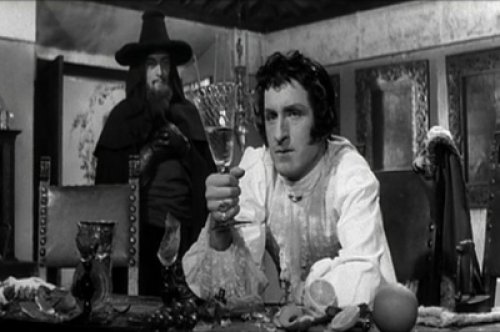Reviews - Saragossa Manuscript
Saragossa Manuscript
Reviewed By John Stakes

Saragossa Manuscript
Last Sunday the club took a huge step back into the past, to 1965 to be precise, for the screening of the surreal Polish three hours' epic "The Saragossa Manuscript", by the director Wojciech Has.
The film's original running time was twenty minutes longer, but following a limited yet modestly successful initial release when it was edited down to two and a half hours, it was rediscovered uncut in the 1990s by Jerry Garcia (of Grateful Dead fame) who with Francis Ford Coppola and Martin Scorsese re-edited it with a new print. Unfortunately Garcia, having paid for the restoration, died before the work was completed, and Coppola and Scorsese took over the project.
The story telling narrative is richly complex and space does not permit a detailed exposition of the plot. Briefly two officers on opposite sides of the Napoleonic Wars find a manuscript in an upper room of an inn. One of the officers recognises its author as his own grandfather Alphonso Van Worden who was an officer in the Walloon Guard. The manuscript contains drawings of two men hanging from the gallows and two women in a bed
Van Worden had travelled in this part of Spain many years earlier but is plagued by evil spirits. On his journey he meets a Qabalist (Mystic), a Sultan and a gypsy who tell him further stories, many of which intertwine and interrelate with each other so that later tales shed light on previous experiences of other story tellers. Eventually the film comes full circle when Alphonso is given the book by a Sheik and told to write his own story. The Sheik explains that all the earlier events were a game designed to test his character. He awakes under the gallows with his two servants, and starts to write in his book when he is told that two princesses we met earlier are waiting for him and he throws the book down where it is later found by his grandson.
Trying to work everything out rationally would be a mistake and even Alphonso stops the action to figure out what is going on. "I've lost the feeling of where reality ends and fantasy takes over" he says at one point, and arguably echoes the thoughts of everyone watching. It is clear at least why the project attracted Garcia who knew a thing or two about altered states and fractured minds. The film's puzzle format is riddled with riddles but is propelled by a strange dream like logic of its own. Though it may have seemed very intricate for its day (and one expert advised taking a copy of the plot to the cinema to aid understanding and heighten appreciation!), perhaps the complications and pace of modern life have diluted the impact of the film's structure and appeal. It left its audience distinctly underwhelmed: a curio and curate's egg combined.
The screenplay was taken from an 1815 novel by Jan Potocki, an explorer and occultist who committed suicide a year after his book was published which may not come as a complete surprise. One can imagine that here was material right up Terry Gilliam’s street had he been minded to re-make the film and reproduce the Salvador Dali imagery (didn’t he once try to film Don Quixote?).
But didn't the day end well! Before the clock struck twelve "Amour" screened the previous week had picked up two of the most coveted Baftas, one for "Best Film in a language other than English" and the other for "Best Actress" for 85 years old Emmanuelle Riva with her deeply penetrating portrayal of stroke victim Anne.
Riva was sensational, beating off Helen Mirren and the generations younger Jessica Chastain, Jennifer Lawrence, and Marion Cotillard. The daughter of an Italian sign writer and born in Vogues Eastern France, Riva always wanted to be an actress and came to the fore in the 1959 film "Hiroshima Mon Amour". She deliberately kept out of the screen limelight and spent most of her career on the stage. She never married, or had children and lives alone in Paris. She is also Oscar nominated and will be celebrating her 86th birthday on the day she will learn whether she has triumphed again.
What an inspired committee choice of film and seen by so many in Keswick last week. Judging from the surprised looks on some of the faces when these Baftas were announced, whilst many in the Opera House Covent Garden may have heard of Michael Haneke's masterpiece, it seemed but a few only had watched it!
Next Sunday sees the screening of the 2012 Portugese film "Tabu" from celebrated director Miguel Gomes. The much respected "Sight and Sound" publication listed it in the number 2 slot of their best films of 2012…..one place ahead of "Amour" so should be well worth watching.
The film's original running time was twenty minutes longer, but following a limited yet modestly successful initial release when it was edited down to two and a half hours, it was rediscovered uncut in the 1990s by Jerry Garcia (of Grateful Dead fame) who with Francis Ford Coppola and Martin Scorsese re-edited it with a new print. Unfortunately Garcia, having paid for the restoration, died before the work was completed, and Coppola and Scorsese took over the project.
The story telling narrative is richly complex and space does not permit a detailed exposition of the plot. Briefly two officers on opposite sides of the Napoleonic Wars find a manuscript in an upper room of an inn. One of the officers recognises its author as his own grandfather Alphonso Van Worden who was an officer in the Walloon Guard. The manuscript contains drawings of two men hanging from the gallows and two women in a bed
Van Worden had travelled in this part of Spain many years earlier but is plagued by evil spirits. On his journey he meets a Qabalist (Mystic), a Sultan and a gypsy who tell him further stories, many of which intertwine and interrelate with each other so that later tales shed light on previous experiences of other story tellers. Eventually the film comes full circle when Alphonso is given the book by a Sheik and told to write his own story. The Sheik explains that all the earlier events were a game designed to test his character. He awakes under the gallows with his two servants, and starts to write in his book when he is told that two princesses we met earlier are waiting for him and he throws the book down where it is later found by his grandson.
Trying to work everything out rationally would be a mistake and even Alphonso stops the action to figure out what is going on. "I've lost the feeling of where reality ends and fantasy takes over" he says at one point, and arguably echoes the thoughts of everyone watching. It is clear at least why the project attracted Garcia who knew a thing or two about altered states and fractured minds. The film's puzzle format is riddled with riddles but is propelled by a strange dream like logic of its own. Though it may have seemed very intricate for its day (and one expert advised taking a copy of the plot to the cinema to aid understanding and heighten appreciation!), perhaps the complications and pace of modern life have diluted the impact of the film's structure and appeal. It left its audience distinctly underwhelmed: a curio and curate's egg combined.
The screenplay was taken from an 1815 novel by Jan Potocki, an explorer and occultist who committed suicide a year after his book was published which may not come as a complete surprise. One can imagine that here was material right up Terry Gilliam’s street had he been minded to re-make the film and reproduce the Salvador Dali imagery (didn’t he once try to film Don Quixote?).
But didn't the day end well! Before the clock struck twelve "Amour" screened the previous week had picked up two of the most coveted Baftas, one for "Best Film in a language other than English" and the other for "Best Actress" for 85 years old Emmanuelle Riva with her deeply penetrating portrayal of stroke victim Anne.
Riva was sensational, beating off Helen Mirren and the generations younger Jessica Chastain, Jennifer Lawrence, and Marion Cotillard. The daughter of an Italian sign writer and born in Vogues Eastern France, Riva always wanted to be an actress and came to the fore in the 1959 film "Hiroshima Mon Amour". She deliberately kept out of the screen limelight and spent most of her career on the stage. She never married, or had children and lives alone in Paris. She is also Oscar nominated and will be celebrating her 86th birthday on the day she will learn whether she has triumphed again.
What an inspired committee choice of film and seen by so many in Keswick last week. Judging from the surprised looks on some of the faces when these Baftas were announced, whilst many in the Opera House Covent Garden may have heard of Michael Haneke's masterpiece, it seemed but a few only had watched it!
Next Sunday sees the screening of the 2012 Portugese film "Tabu" from celebrated director Miguel Gomes. The much respected "Sight and Sound" publication listed it in the number 2 slot of their best films of 2012…..one place ahead of "Amour" so should be well worth watching.
Find A Film
Search over 1500 films in the Keswick Film Club archive.
Friends
KFC is friends with Caldbeck Area Film Society and Brampton Film Club and members share benefits across all organisations
Awards
Keswick Film Club won the Best New Film Society at the British Federation Of Film Societies awards in 2000.
Since then, the club has won Film Society Of The Year and awards for Best Programme four times and Best Website twice.
We have also received numerous Distinctions and Commendations in categories including marketing, programming and website.
 Talking Pictures
The KFC Newsletter
Talking Pictures
The KFC Newsletter
Links Explore the internet with Keswick Film Club


